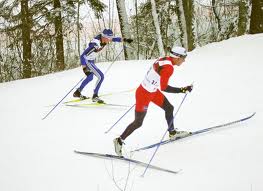Heart rates, wattage and VO2 max testing.
“Heart rate should be an indicator not a dictator”
says Bryan Fish the Development Coach for the US cross country ski team.
This nugget of information came out at a breakfast conversation at GAIN. I know very little about the long endurance sports, so was fascinated to hear what Bryan had to say.
He expands further here.
Using Heart Rates
We have gone up and down through the trials and tribulations of heart rate, lactate, and RPE testing.
Our challenge is that our sport is so dynamic that we can’t use pace like running and swimming. The stop watch is ultimately the “tool” best utilized if we could but variability is too great from one day to the next.
The wattage meter in cycling is ultimately where our sport would like to go.
The cool thing about wattage is it demonstrates a consistent physical output that is effective in the direction of travel. I can put forth a lot of energy but that doesn’t necessarily mean it is down the track or down the road. Output plus pace provides that.
GPS has become popular because of that. As you know our mantra for tools – “indicate not dictate” is key. We encourage athletes to use and NOT use them at times. The goal is to learn pacing and energy output without having a monitoring unit all the time.
Some workouts are about speed and need not be monitored, since the neural system is the target. Other times we want athletes “individually controlled” but the heart rate still remains a guideline and remain in a general output.
An athlete needs to push, hold back and explore pacing strategies and technique modifications to become ever more efficient. The heart rate monitor can mindlessly dictate a session OR be a mindful tool to make an athlete more independent and more efficient. The devil is in the details.
VO2 Max Testing for skiiers
 We have a high tech facility with 2 skiing treadmills and the ability to provide athletes oxygen supplementation to simulate a variety of altitudes. We do all max VO2 tests at sea level conditions. We test our athletes rollerskiing for specificity.
We have a high tech facility with 2 skiing treadmills and the ability to provide athletes oxygen supplementation to simulate a variety of altitudes. We do all max VO2 tests at sea level conditions. We test our athletes rollerskiing for specificity.
That being said – our coaches and athletes look at how long they last on the treadmill as probably the most significant factor of success from the test. Why – because the length of the test means you are going the fastest. Our athletes have high VO2’s. There is a baseline amount of capacity that is necessary to be a World class endurance athlete.
Our sports science coined it the “cloud of success.” Many of our developing athletes are in this “cloud.” That being said, you wouldn’t be able to point out the most successful to lesser success by looking merely at VO2 results. This is true both with our World Cup & development athletes. There are many capacities that make up an athlete.
Another important point is that VO2 CAN and DOES change slightly throughout the year and it CAN improve like any physical capacity. There is certainly diminishing return with World class athletes. It takes A LOT to move a LITTLE, but we can all improve.
I have been involved with or personally administered over 450 VO2 tests. I am suspicious with anyone who uses averages. Each athlete is unique and responds in a unique way. I could explain this but my fingers would be bloody from typing so long. Bottom line – if you are going to test then make it personalized and repeat it looking at the personal results from the past tests.
Other fitness tests for skiiers
 We have tests that compliment and verify one another. For example, we have VO2, hemoglobin mass and blood testing. A low VO2 might be due to low ferretin.
We have tests that compliment and verify one another. For example, we have VO2, hemoglobin mass and blood testing. A low VO2 might be due to low ferretin.
The hemoglobin and blood testing will catch that and a lowering VO2 will likely result in lowering performance in this specific situation.
The basic premise is, like the heart rate monitor, VO2 testing is a tool that can be effectively used or grossly abused. The latter is often the case unfortunately. There is no ONE validating test. The test should be utilized to track and steer training for the individual. FMS, strength, etc testing should not be substituted for VO2 testing. They are different tests and should be considered important factors as well. Secondly, testing is limited in its capacity, so know what it tests and know what it does NOT test.
Vern’s presentation nailed in on the head. What is your objective for the test? Bryan Fish.
(More on fitness testing here)

Thanks to Bryan for this. We are working with 3 young road cyclists, so this information helps me a lot. It was good to get this information and see things from a completely different perspective.
If I hadn’t decided to sit by Bryan and chat with him at breakfast, I would still be in the dark. One of the beauties of GAIN is the mixture of people: if all you to do is mix with S&C coaches, life becomes very dull.